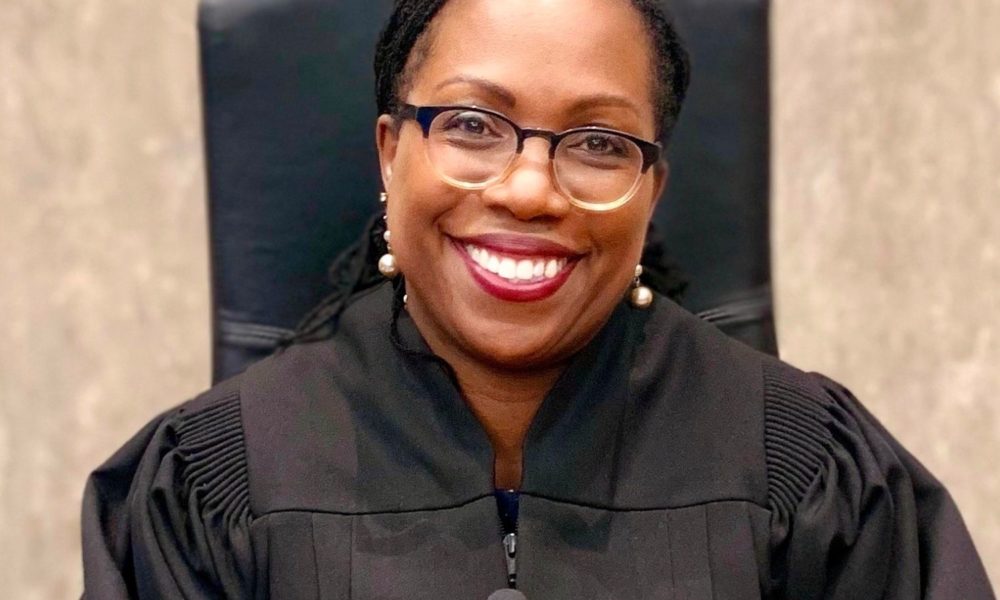At President Biden’s first State of the Union address, he can tout a historic promise he kept from the campaign trail in 2020: his nomination of Ketanji Brown Jackson to become the 116th Associate Justice of the US Supreme Court. Standing on the shoulders of the likes of Constance Baker Motley and many others, she makes history as the first Black woman ever nominated for a seat on the high court. Judge Brown Jackson, a former clerk of Associate Justice Stephen Breyer, is a brilliant jurist with experience as a public defender–a rarity for the US Supreme Court.
Despite the oft-repeated criticism that Black women nominees would be an affirmative action pick, Judge Brown Jackson’s judicial experience on the DC circuit and other legal venues, makes her eminently qualified for the post. Perhaps not surprising, many are not happy about President Biden’s explicit mention of race and gender. Yet, for most Black Americans, this pushback is nothing new, we have always had to be twice as good.
Judge Brown Jackson is a graduate of Harvard University and Harvard Law School, a former editor of the Harvard Law Review, a former Vice Chair of the US Sentencing Commission, and member of the Harvard Board of Overseers. The fact of the matter is: President Biden could not have selected a more qualified candidate.
Justice Breyer announced his retirement in late January and gave President Biden the opportunity to keep his campaign promise. Brown Jackson was known to be one of three on a short list of candidates closely considered for the nomination by President Biden and Vice President Harris.
Why Representation Matters
The US Supreme Court has existed for 233 years and 115 justices have sat on the high bench. Of those, only five justices have been women (Sandra Day O’Connor, Ruth Bader Ginsberg, Sonia Sotomayor, Elena Kagan, and Amy Coney Barret); only two justices have been Black (Thurgood Marshall and Clarence Thomas), and only one has been a woman of color (Sonia Sotomayor). Otherwise, the court has been staffed predominantly by white men. But even among the white men, there were still some historic firsts. Roger Taney was the first person of Catholic faith to sit on the Supreme Court and Louis Brandeis was the first person of Jewish faith. Still, an overwhelming majority were white men and arguably, propertied.
When he stated that he would nominate a Black woman, President Biden was accused by some of nominating an unqualified jurist to the bench. But any such aspersions claiming that selecting a Black woman would mean nominating someone unqualified, were patently ridiculous. Ketanji Brown Jackson and the other women on the president’s long and short lists for consideration are indisputably qualified. The other candidates under consideration had similarly stellar resumes. Leondra Kruger clerked for John Paul Stevens and is currently a California Supreme Court Justice and Michelle Childs is currently a U.S. District Court judge in South Carolina. All three candidates on the White House’s short list have resumes that align with current and past members of the court except Michelle Childs – she attended a public institution and would have diversified the court by academic pedigree had she been nominated.
And the pool was wide and deep: longer lists of possible nominees included the likes of Sherrilyn Ifill, who is currently the president and director-counsel of the NAACP Legal Defense and Educational Fund (LDF); Melissa Murray, who is currently a professor of law at New York University; Michelle Alexander, currently an associate professor of law at The Ohio State University and the acclaimed author of the The New Jim Crow. Any one of these women would have been a highly qualified addition to the court and there are a bevy of others roaming our nation today as well.
It matters that the Court will include descriptive representation in the person of a Black woman. While many experts note that this new addition will not change the ideological makeup of the court–there will still be a 6-3 conservative majority, swinging to Republican appointees–we should not downplay the importance of this historic nomination. Even if the new Supreme Court Justice is in the minority, she will still have the opportunity to write dissenting opinions that could matter for future cases concerning some of the nation’s most pressing issues including: climate change, voting rights, healthcare, reproductive rights, gun rights, religious freedoms, and civil liberties.
Is this progress?
This appointment is a step toward progress, but there is still more work to be done. As of 2020, Black women make up only three percent of judges on the US Circuit and District Courts—making them a severely underrepresented demographic. Black women are an active part of our political system and one of the most important voting blocks of the Democratic Party voter base. The descriptive representation for Black women is not an added bonus, it’s the whole point. Black women are the backbone of our democracy and should have representation at the highest levels of our system of government. Obviously the judicial branch, and the Supreme Court in particular, is seen as apolitical, although it has become more political in recent years.
The nomination of Judge Ketanji Brown Jackson is not only historic and exciting, it is something that we should celebrate because it’s good for justice. She is more than qualified for this role and it is long past time for a Black woman to sit on the Supreme Court. We look forward to watching history being made and urge the Senate to move her confirmation forward without delay.

